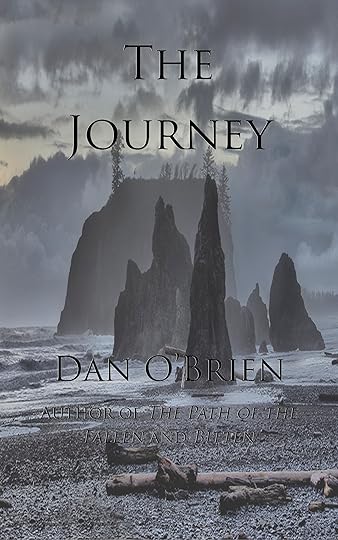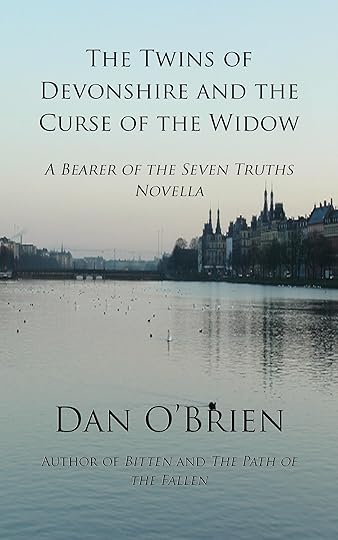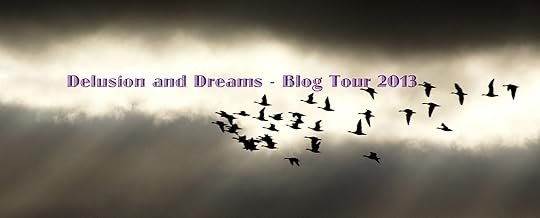K.B. Walker's Blog, page 3
January 24, 2014
The break is over!
Writers’ block, too busy, need a holiday… all those excuses are behind me now. It’s back to work big style. Today, I must finish a short story involving some of the characters from Once Removed  for an anthology Crooked Cat are putting together.
for an anthology Crooked Cat are putting together.
Tomorrow, I’m running a workshop for a group in Howarth on setting up a writers’ group.
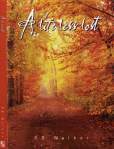 On Sunday, I’ll be driving to Coulsdon for my niece’s baptism but good friends from the Holmfirth Writers’ Group will be reading a short clip from A Life Less Lost for me on Two Valleys Radio. Phew!!!!
On Sunday, I’ll be driving to Coulsdon for my niece’s baptism but good friends from the Holmfirth Writers’ Group will be reading a short clip from A Life Less Lost for me on Two Valleys Radio. Phew!!!!


December 7, 2013
Crooked Cat’s Christmas Sale Now On!
October 8, 2013
Sharing the joy
Many, many moons ago, when I left the safety and security of my teaching job to test the fantastical idea that I might be able to write a book, I looked for help. In my nearest town, Huddersfield, I discovered an organisation called CIDA (Creative Industries Development Agency). CIDA offered mentoring and support including training to people in or hoping to work in creative industries. Who knew such places existed? Along with a few useful courses, they assigned me a mentor by the name of Adam Strickson.
Adam Strickson is a playwright, poet and occasional visual artist. He’s done some amazing things in his life and I am very grateful for the time and advice he gave to me. I’m thrilled to be able to share my joy over his continued success and let him tell you what he’s up to ~
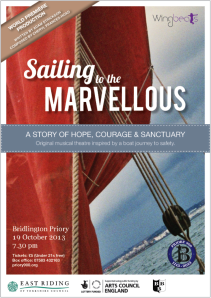 The dramatic cantata, ‘Sailing to the Marvellous’, which I initiated and have com
posed the libretto for, will be taking place at Bridlington Priory on
Sat
urday Oc
tober 19th at 7.30pm, with choirs, professional soloists and 100 children.
The dramatic cantata, ‘Sailing to the Marvellous’, which I initiated and have com
posed the libretto for, will be taking place at Bridlington Priory on
Sat
urday Oc
tober 19th at 7.30pm, with choirs, professional soloists and 100 children.
Sailing to the Marvellous is a dramatic cantata for choirs, instrumentalists and child actors commissioned by Priory 900 from the Wingbeats team who created the operas Flight Paths and Amy’s Last Dive, the East Riding’s official contribution to the Cultural Olympiad.
The cantata tells a powerful present-day story. Runa, a young Christian woman from Iraq, flees persecution. She meets a group of children who have escaped from the wars of Africa, and together they travel to England in an old fishing boat. Eventually the boat reaches Bridlington where, like many before them, Runa and the children seek sanctuary.
Tickets are £5. http://www.priory900.org/events/cantata-bridlington/ Tel 07583432163
On Saturday Nov 9th, I’m appearing at Manchester’s Poets and Players, at 2.30 pm at the John Rylands Library, Deansgate. There will be music and live poetry from the film I made with Lucy Bergman, ‘I am the ferryman’, about my relationship with Benjamin Britten’s music and his with the landscape of Suffolk. Musicians are ‘Our Liberated Winter’ (Robin Bowles and Simon Prince) and there will be a showing of the film. http://poetsandplayers.co/future-events/saturday-9th-nov-2-30-4-00-pm-poetry-by-george-szirtes-music-by-our-liberated-winter/
A pilot programme for an exciting new venture at Bradford Cathedral on Wednesday December 4th at 7pm, ‘Air on Brontë Moor’. This is a new collaboration with film-maker Simon Warner and saxophonist David Wilson. We’ll be presenting films of the landscape the Brontës were influenced by with live saxophone and poetry from the sisters, plus poems by Sylvia Plath, Ted Hughes, Charlotte Mew and and a performance piece from me in response to the Brontës. We hope to tour this next year. Tickets will be £5, available from Bradford Cathedral from the middle of this month.
http://www.bradfordcathedral.org/ BD1 4EH Tel: 01274 777720
Related articles
Brontë’s Contributions (emilybronteparminder.wordpress.com)
Starting Emily Bronte’s Poems (novembersautumn.wordpress.com)


September 14, 2013
Crooked Cat Book Sale!
Pop over to Amazon to see all the Crooked Cat Books on sale for this week only. They have a brilliant selection across a wide range of genres ~ something for everyone, including Once Removed. Just follow this link:
http://www.amazon.co.uk/Once-Removed-ebook/dp/B007YUZXC4/ref=sr_1_1?ie=UTF8&qid=1379158439&sr=8-1&keywords=Once+Removed
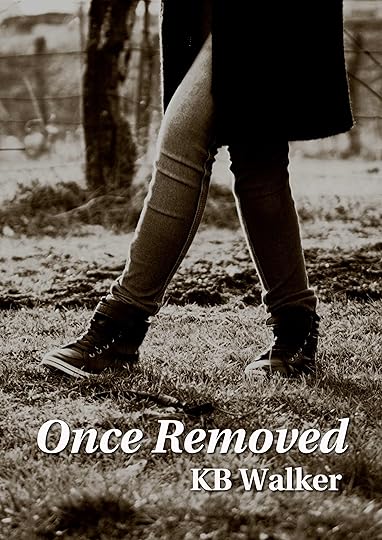
Related articles
A Gathering of Cats (crookedcatbooks.wordpress.com)
Another Launch and a Brace of Interviews (stacmysteries.com)
Topaz Eyes goes on Tour (crookedcatbooks.wordpress.com)
A first for techno-twit! (crookedcatbooks.wordpress.com)
RIP Marlene (crookedcatbooks.wordpress.com)


July 19, 2013
Cake and Books ~ a little bit of heaven in Lincoln
 I recently had the pleasure of visiting the BookStop Cafe in Lincoln and, I must say, it’s even more wonderful in person than the photos convey! Especially now that my novel, Once Removed, memoir, A Life Less Lost and several anthologies, which include my work, reside on those very shelves
I recently had the pleasure of visiting the BookStop Cafe in Lincoln and, I must say, it’s even more wonderful in person than the photos convey! Especially now that my novel, Once Removed, memoir, A Life Less Lost and several anthologies, which include my work, reside on those very shelves 
Joff Gainey tells us the story behind this fabulous enterprise:
 Becky and I have both been interested in books all our lives. We love reading and the escape provided by the stories. Twelve years ago we retrained ourselves by attending the same teacher training course at Bishop Grosseteste University in Lincoln. Becky is, presently, still teaching and I, due to family circumstances became a house husband and threw myself into writing. My first book, self published last October, Sleeping On A Cloud has been in my head since childhood. House husbandry gave me the chance to place on to paper.
Becky and I have both been interested in books all our lives. We love reading and the escape provided by the stories. Twelve years ago we retrained ourselves by attending the same teacher training course at Bishop Grosseteste University in Lincoln. Becky is, presently, still teaching and I, due to family circumstances became a house husband and threw myself into writing. My first book, self published last October, Sleeping On A Cloud has been in my head since childhood. House husbandry gave me the chance to place on to paper.Understanding, between us, that life was difficult for Indie Authors, and the venue becoming available, we both realised our dream of combining a cafe with books was possible. If we could support local and independent authors as well, even better.
We sell their books along with second hand books. The authors are providing copies for sale including an extra copy for the customers to read/browse and then hopefully buy. We are also considering having art/paintings on the walls to help local talent to display their work.

Our plans for the future are to provide allocated story hour. Where children may come along and listen to stories. Becky and I have both been story tellers. On a similar note we hope to have special story evenings e.g. ghost stories around Halloween, Christmas stories, themes of a variety of subjects.
Amongst all this we sell tea/coffee, cakes, sandwiches and ice cream.
Links:
http://bookstopcafe.com/
https://www.facebook.com/BookStopCafe
@bookstopcafe


June 28, 2013
Writing from the other side
 A Writing Perspective from the Other Side of the Fence
A Writing Perspective from the Other Side of the Fence
A Guest Post by Dan O’Brien
Life as a writer can be hard sometimes. Success is elusive; fans shift as often as a summer wind. Yet, we persevere, writing into the late hours of the night and waking in the early hours of the morning to log the hours and enter, for a time, the worlds we create. When I first started writing, more than a decade ago, it was because I loved the idea of immersing myself in a place where I could construct the narrative; walk through dense forests and to the tops of mountains. Over time the process became more about writing as a tool to move through emotions and languishing memories that required catharsis.
Writing takes on many forms, for many different writers, over the course of our lives. For me, the process is the reward. I love to write.
When I ask myself that silly question of what I would do if I had all the money in the world, the answer is always quite simple: write. Now more than a decade later, I have a renewed sense of purpose and have become quite adept at balancing the spinning plates of responsibility.
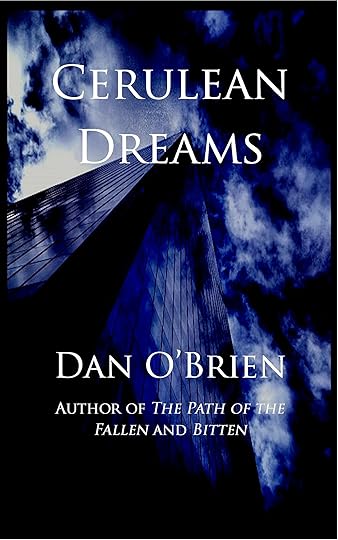 Recently, between being a full-time graduate student and writer, I joined Empirical magazine as an editor – among other responsibilities. A national magazine similar in spirit to Harper’s or The Atlantic, the magazine is firmly rooted in a West Coast sensibility. There is a little something for everyone, and honestly, the hope is that everyone will take a look. Contributors to the magazine come from around the globe and cover everything from politics to fiction.
Recently, between being a full-time graduate student and writer, I joined Empirical magazine as an editor – among other responsibilities. A national magazine similar in spirit to Harper’s or The Atlantic, the magazine is firmly rooted in a West Coast sensibility. There is a little something for everyone, and honestly, the hope is that everyone will take a look. Contributors to the magazine come from around the globe and cover everything from politics to fiction.
Working at a magazine, especially at this point in its maturation, is a wonderful experience. There are so many moving parts that enliven your day. Sometimes I spend the day sorting through fiction and poetry submissions, searching for that piece of prose, or perhaps a stanza, that ensnares my imagination. Other days I am editing, constantly referring to the Chicago Manual of Style to ascertain the correct usage of an archaic sentence structure. As a writer, the prospect of editing and rummaging through the work of others might not sound exciting, but there are some wonderful consequences:
You learn to become a better editor of your own work
You begin to recognize redundant sentence structures and overused phrases
Your grasp of language grows exponentially
However, the most important component for me is:
You get to help others bring their work into a public forum

For many writers, and certainly for me early in my writing career, the notion of being picked up by a magazine or a small press was foremost in my mind. It was that distant promise of publication and everything that goes with it that pushed me forward. When I got rejection letters, most of which lacked a personal touch, I would get down on my writing, denigrate my ability.
The years passed, during which thousands of rejection letters amassed, and I realized that the pursuit of writing for a purely extrinsic reward was dooming myself to Vegas-style odds. It became clear to me that I needed to write because I loved it, and then find a way to share it with others – even if it was not through traditional routes. I found that I was more comfortable with my writing when I did it for the pure joy of it.
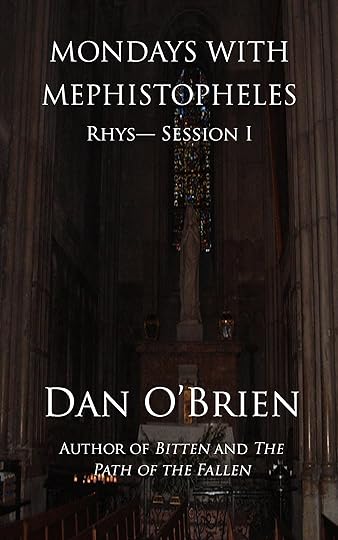 Now that I am on the other side of the fence, so to speak, I have noticed a few myths about submitting to paying publications that otherwise mystified and frustrated me prior to becoming an editor and being responsible for interacting with first-time and established authors.
Now that I am on the other side of the fence, so to speak, I have noticed a few myths about submitting to paying publications that otherwise mystified and frustrated me prior to becoming an editor and being responsible for interacting with first-time and established authors.
I have decided to provide a humorous, but serious, collection of things you should do and things you shouldn’t do when submitting and entering into a discourse with a publication – sprinkled, of course, with some anecdotes. And without further ado (or perhaps slight ado if you count this sentence here):
Things You Should Do
Read the publication you are submitting to before sending an email. This one sounds obvious, I know. However, it happens so often that it warrants mentioning. If you have written a brilliant piece of prose that is about zombies, it is quite likely that Popular Mechanics will not be that interested in it. Pick up an issue of the magazine you are interested in submitting to and familiarize yourself with the kinds of stories they publish. The next part is the hardest part: be honest. Does your piece fit with what they publish?
Read and follow the submission instructions. Again, a no-brainer. If you are thinking that you don’t know where to find the submission instructions and you just have an email address, be prepared for disappointment. Your email might go to submission purgatory with a one-liner response about having received your correspondence – if you’re lucky.
Address your submission to the appropriate person. If you are thinking that I am giving you the obvious pointers, then you are quite right. With that in mind, imagine that I still receive hundreds of emails a month that manage to ignore these simple suggestions. If you are writing a stunning expose on corporate greed, the poetry editor is probably not the best destination for your work.
Edit your work. I tell this to students a lot, so I will mention it here as well: spell check in Microsoft Word is not sufficient. I am not saying that you need to be a copyeditor to submit to a magazine, but do yourself a favor and read it out loud. If something sounds funny when you read it, you can only imagine how it will sound to an editor who is choosing among thousands of articles and stories to determine what goes to print.
Be cognizant of turnarounds. By this I mean, the amount of time between when you sent in the work until you hear back from an editor about the status of your submission. Nothing will send your work to the bottom of a slush pile than to send a follow-up email the day after you submitted, wondering whether or not you are going to be in the magazine. Most publications will post how long it takes to hear back from them about the status of a submission, and an amount of time after which you should contact them if you haven’t heard from them.
Things You Shouldn’t Do
Send an email telling an editor that they would be stupid not to publish your work. It always surprises me when I get an email telling me that I need to publish a story, poem, or piece of nonfiction because it is the next best thing. Top this off with letting me know that I would be a fool not to accept it, almost guarantees a trip to the trash can.
Send a photocopy of your story by registered mail. If you want to have your story in a magazine, start by giving it to editors in a format that they can actually use. By sending a faded and blurry photocopy of your forty-word poem and declaring that it is a soul-searching masterpiece does not inspire as much confidence as you would think.
Contact an editor on a frequent basis about the status of your submission. I have to sort through hundreds of emails a day, edit for the current issue, and work on editing an anthology; not to mention a thousand other intangibles. We posted a time table about getting back to you for a reason: read it.
Be discouraged by a form rejection letter. This is a bitter pill to swallow for many writers. They think the form rejection letter means that the editor didn’t read their work, or simply had things already planned and was stringing writers along. The reality is on any given month I send out hundreds upon hundreds of rejection letters. There is simply not enough time in the day to offer feedback to every single person. This not to say that I do not offer feedback, or that editors do not offer feedback in general, but instead the process is streamlined so writers can be responded to in a reasonable amount of time.
Call the magazine to find out about your submission. This is subsumed by not contacting an editor about the status of your submission before enough time has passed, but I thought it warranted a special mention considering it is really going the extra mile in terms of being an irritation. If we haven’t gotten back to you yet, calling us is not going to suddenly make us more accessible.
Send another email with corrections. Read twice, send once. If you don’t think what you sent is ready for publication, then please don’t send it. You get one chance at a first impression, and nothing speaks to being underprepared and unprofessional than sending a draft and immediately following up with another draft. If your piece needs work, note that in your submission, but don’t send a series of emails chronicling the different stages of the edits for that story. The exception, of course, is if you have already been accepted and you have been asked to make edits.
Contact the magazine to air your frustrations about not being selected. I say this with all seriousness. It is very likely that you got rejected because the piece was not a good fit and not that the magazine has decided to order a hit on your writing career. Please don’t treat it that way. Lashing out at a publication for sending a form rejection letter, or passing on a piece you have written, reeks of a lack of professionalism and could impact your ability to publish elsewhere. Many editors are friends, especially in the digital age, and word spreads fast.
Contact the magazine to ask if you think a story you are working on would be a good fit elsewhere. I can appreciate the sentiment. A lot of editors are writers themselves, and they love talking about the process and the product. I find myself building friendships with writers, those we publish and those we do not, and often I will give them suggestions about their work. However, if you don’t know me personally and have never been published or solicited in any way to use me as a sounding board, then do not contact me and ask if a poem or story would be a good fit at another magazine. If you think it is ready for publication, then submit it here. An obvious exception would be if the writer knew the story would not be a good fit and asked because they were uncertain in venturing into new territory.
I could probably keep listing things you shouldn’t do, but I will wrap it up there. I 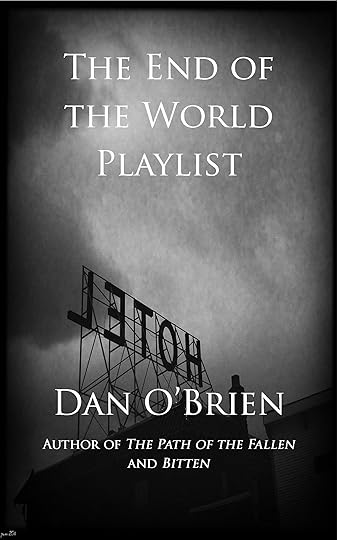 encourage you to keep trying and keep writing. Things only get better with time, and time is all we really have. I love to hear from other writers and potential readers, so please stop by and say hello.
encourage you to keep trying and keep writing. Things only get better with time, and time is all we really have. I love to hear from other writers and potential readers, so please stop by and say hello.
 Bio: A psychologist, author, editor, philosopher, martial artist, and skeptic, Dan has published several novels and currently has many in print, including: The End of the World Playlist, Bitten, The Journey, The Ocean and the Hourglass, The Path of the Fallen, The Portent, and Cerulean Dreams. Follow him on Twitter (@AuthorDanOBrien) or visit his blog http://thedanobrienproject.blogspot.com. He recently started a consultation business. You can find more information about it here: http://www.amalgamconsulting.com/.
Bio: A psychologist, author, editor, philosopher, martial artist, and skeptic, Dan has published several novels and currently has many in print, including: The End of the World Playlist, Bitten, The Journey, The Ocean and the Hourglass, The Path of the Fallen, The Portent, and Cerulean Dreams. Follow him on Twitter (@AuthorDanOBrien) or visit his blog http://thedanobrienproject.blogspot.com. He recently started a consultation business. You can find more information about it here: http://www.amalgamconsulting.com/.
Related articles
Writing, Rejection, and What To Do Next (aprilyamasaki.com)
Questions you always wanted to ask an editor, but were afraid to ask (writingwranglersandwarriors.wordpress.com)
Every writer needs at least ONE rejection letter. (eccentricchai.com)
A Few Thoughts on Rejection (nepheletempest.wordpress.com)
How to Read a Rejection Letter (aimiekrunyan.wordpress.com)
Nobody Likes to Feel the Sting of Rejection (write-2-be.com)


June 6, 2013
Covers to be judged by
Creating, choosing or sourcing covers can be a bit of a nightmare but worth the effort, if you hope to attract readers. Maria Savva shares the story behind the cover for her latest book.
It’s always difficult deciding on a cover for a book. I like my book covers to say a bit about the book contents and admit to being a bit of a control freak about them.
I have a Facebook friend, who is also a photographer, Martin David Porter, of Mart’s Arts Photography. In the past when I’ve commented on his photographs he’s often said that if I want a photo for a book cover I should ask. So I approached Martin when looking for a photo for Delusion and Dreams. He sent me a couple of suggestions, but I had by then decided that I wanted a picture of a daisy.
I thought a daisy might be nice because it links in well with both delusion and dreams. Daisies are often used for the game, ‘he loves me, he loves me not’, where someone picks off the petals of a flower to get an answer to this burning question. To believe the answer could be seen as delusion.
I found a photograph of a daisy on morguefile.com, so was going to use that. Then Martin sent me a picture of a daisy that he had taken, and that was nice, so I was confused.
Then I had the idea of sketching the daisy photo that I had found on morguefile. I like drawing, and thought that it would be nice to have original art on the cover. I used my own art for the cover of The Dream, Pieces of a Rainbow, and Haunted. I did start drawing the daisy, but then realised it was going to take a long time to get it exactly right. While all this was going on, Martin posted a new photo to his Facebook page one day, and as soon as I saw it I knew it would be perfect for Delusion and Dreams. For me, the image of the birds flying represents a wonderful sense of freedom and escape (like a dream). The dark side of the photo is great because there is a dark side to many of the stories in the book. I like the ‘God’s light’ also, which adds an extra dimension.
For the paperback version, I also have another photo on the back cover that Martin sent me, which I think is beautiful. The original daisy photo that I was going to use for the cover, appears in my book trailer.
I hope my readers love the cover as much as I do.
Please visit Mart’s Arts Photography on Facebook. Martin mainly takes band/gig photos, but also has lots of great nature photos on his page:
https://www.facebook.com/MartsArtsPhotography
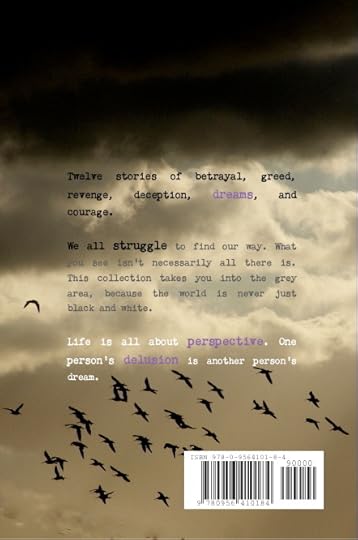
Blurb:
Twelve stories of betrayal, greed, revenge, deception, dreams, and courage. We all struggle to find our way. What you see isn’t necessarily all there is. This collection takes you into the grey area, because the world is never just black and white. Life is all about perspective. One person’s delusion is another person’s dream. Includes five bonus stories.
Maria Savva lives and works in London. She studied Law at Middlesex University and The College of Law. She is a lawyer, although not currently practising law. She writes novels and short stories in different genres, including drama, psychological thriller, and family saga. Many of her books and stories are inspired by her years working as a lawyer, although she has not written a courtroom drama to date. Her most recent novel is Haunted, a crime fiction/psychological thriller.
Author links:
Website: HYPERLINK “http://www.mariasavva.com” http://www.mariasavva.com
blog: HYPERLINK “http://www.goodreads.com/author/show/1418272.Maria_Savva/blog” http://www.goodreads.com/author/show/1418272.Maria_Savva/blog
Facebook Page: HYPERLINK “https://www.facebook.com/pages/Author-Maria-Savva/171466979781” https://www.facebook.com/pages/Author-Maria-Savva/171466979781
Twitter: HYPERLINK “http://Twitter.com/Maria_Savva” http://Twitter.com/Maria_Savva
Buy links for Delusion and Dreams:
Amazon.com: HYPERLINK “http://www.amazon.com/Delusion-and-Dreams-ebook/dp/B00D0EHJHA/” http://www.amazon.com/Delusion-and-Dreams-ebook/dp/B00D0EHJHA/
Amazon UK: HYPERLINK “http://www.amazon.co.uk/Delusion-and-Dreams-ebook/dp/B00D0EHJHA/ref=sr_1_6?ie=UTF8&qid=1369585340&sr=8-6&keywords=delusion+and+dreams” http://www.amazon.co.uk/Delusion-and-Dreams-ebook/dp/B00D0EHJHA/


May 12, 2013
Book of the Day!
 Once Removed is the featured book of the day on asidefromwriting, a website that brings together readers, authors and bloggers from the YA world http://asidefromwriting.com/2013/05/12/iam-once-removed/ A Life Less Lost also gets a mention. For the month of May they are running a fantastic Indie Author event ~ well worth a visit.
Once Removed is the featured book of the day on asidefromwriting, a website that brings together readers, authors and bloggers from the YA world http://asidefromwriting.com/2013/05/12/iam-once-removed/ A Life Less Lost also gets a mention. For the month of May they are running a fantastic Indie Author event ~ well worth a visit.


March 27, 2013
Crooked Cat Easter Sale
March 20, 2013
Adventures in Poetry
Chris Huck has a PASSION for poetry. Combining that passion with an extensive knowledge, incredible artefacts and the team work of other authors creates magical adventures the first Saturday of the month in a little room on the Huddersfield University campus. I’ll let him tell you all about it:
Holmfirth Writers Group runs an Open Poetry Day every month. This comprises of a session where we study a particular poet or group of poets; these have included, Sappho, Emily Dickinson, The Metaphysical Poets, William Blake, the Imagists and Sylvia Plath. Most recently we looked at Christina Rossetti’s poem, Goblin Market http://www.victorianweb.org/authors/crossetti/marketov.html
After coffee we write till lunch time. After lunch we have a review period where we read and discuss poems brought in by those attending (bring 10 copies), please note that we only use constructive criticism.
We begin at 9.30 with a break for lunch at midday and we finish around 3pm. Tea and coffee are free. The venue is Huddersfield University room HWG 07 just beyond the main entrance, ask at the desk. Parking is free, just say ‘Poetry Day’ at the barrier. The cost is £12 waged £8 concessions, which pays for the room.
This is a stimulating day for anyone with an interest in poetry and the Holmfirth Writers, who are the core group, are bright and friendly. Please leave a comment, if you’d like more information.
Related articles
March 21st – World Poetry Day (cbskesl.wordpress.com)






